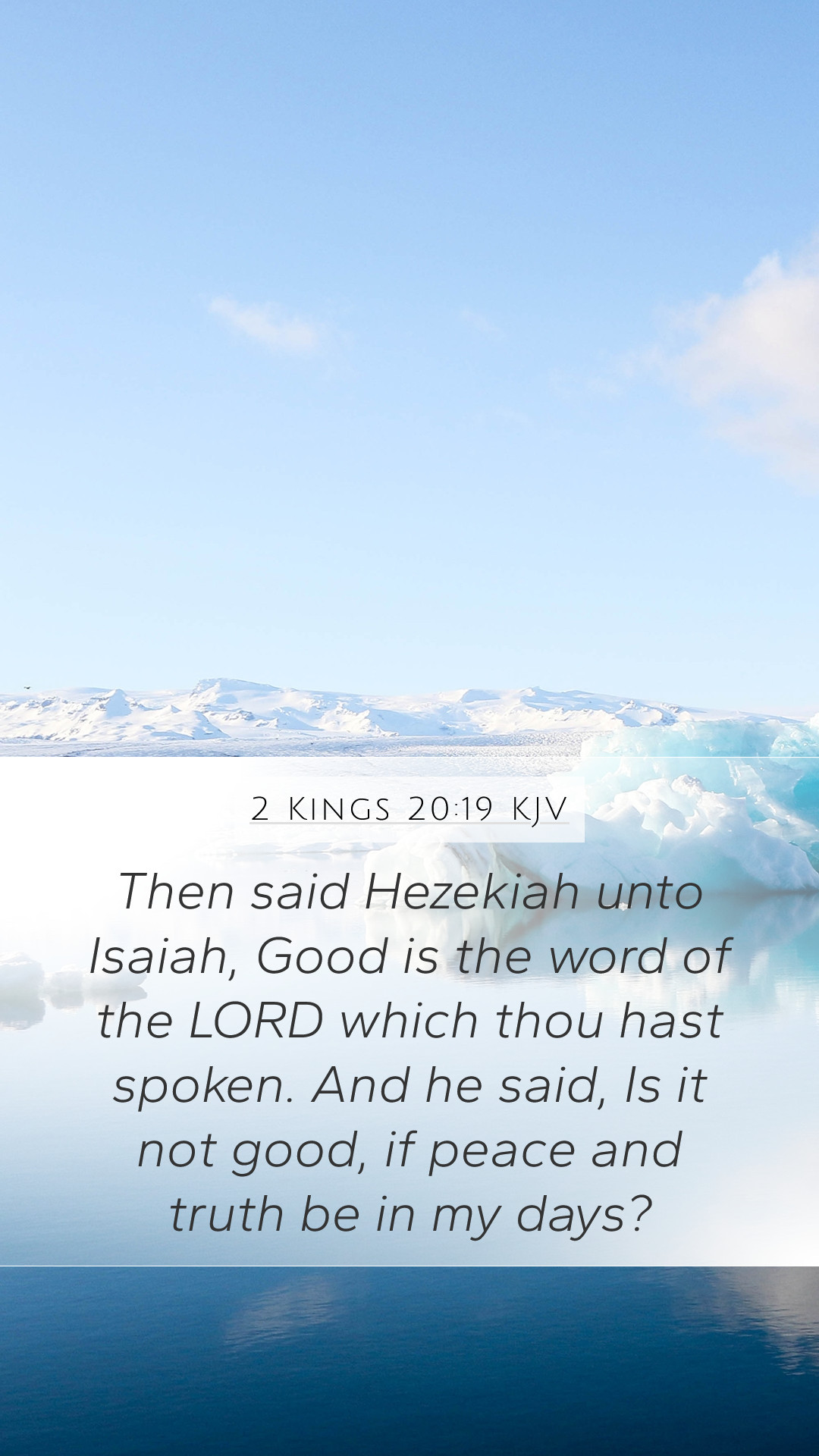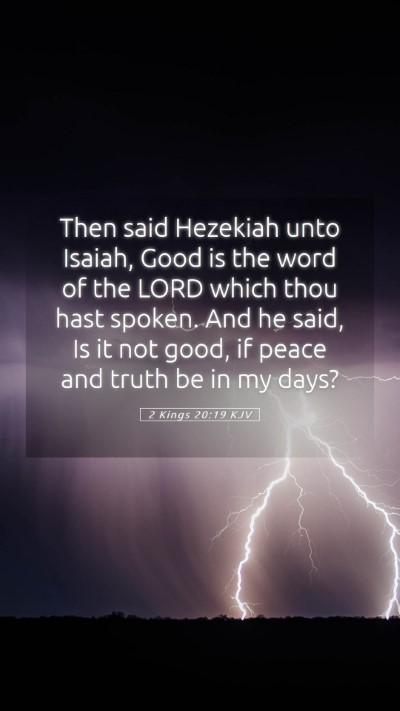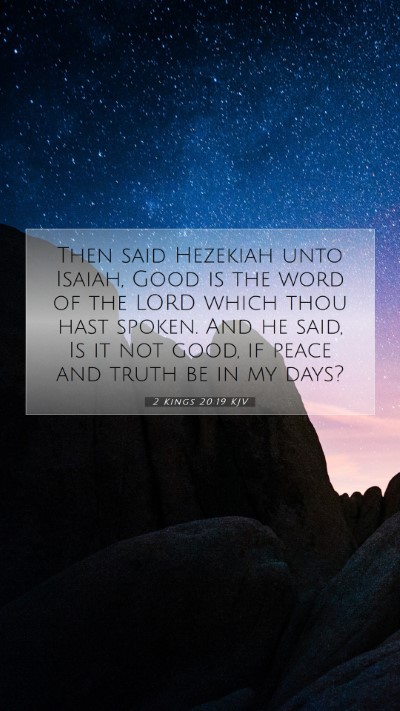Old Testament
Genesis Exodus Leviticus Numbers Deuteronomy Joshua Judges Ruth 1 Samuel 2 Samuel 1 Kings 2 Kings 1 Chronicles 2 Chronicles Ezra Nehemiah Esther Job Psalms Proverbs Ecclesiastes Song of Solomon Isaiah Jeremiah Lamentations Ezekiel Daniel Hosea Joel Amos Obadiah Jonah Micah Nahum Habakkuk Zephaniah Haggai Zechariah Malachi2 Kings 20:19 Meaning
What is the meaning of 2 Kings 20:19?
Then said Hezekiah unto Isaiah, Good is the word of the LORD which thou hast spoken. And he said, Is it not good, if peace and truth be in my days?
2 Kings 20:19 Bible Verse Meaning
Understanding 2 Kings 20:19
Bible Verse: 2 Kings 20:19 - "And Hezekiah said to Isaiah, 'The word of the Lord which you have spoken is good.' For he thought, 'Will there not be peace and truth at least in my days?'
Overview of the Verse
This verse captures the response of King Hezekiah to Prophet Isaiah's prophecy regarding Judah's impending judgment. It reflects a complex mix of resignation, acceptance, and personal concern about the future of his reign.
Key Themes
- Acceptance of God's Will: Hezekiah acknowledges God's word through Isaiah, recognizing the prophetic truth.
- Concern for the Future: His desire for peace and truth during his reign showcases a human tendency to focus on immediate circumstances over future generations.
- Faith amidst Adversity: Hezekiah’s faith shines through, even in the face of hard truths regarding the nation’s fate.
Bible Verse Meanings
The meaning of this Bible verse can be gleaned from multiple public domain commentaries:
-
Matthew Henry:
Henry emphasizes that Hezekiah's reaction reveals a heart that wishes for temporal peace, despite the foreboding nature of the prophet’s words. He notes the tendency of leaders to prioritize their own legacy over the consequences of their actions on future generations.
-
Albert Barnes:
Barnes implies that Hezekiah’s thoughts reflect a self-centered approach, indicating a form of relief that the judgment would not occur during his lifetime. He points out the contrast between genuine concern for national wellbeing versus personal peace.
-
Adam Clarke:
Clarke provides insights into the grace inherent in Hezekiah's attitude, suggesting that he recognizes the inevitable outcomes of divine judgment but finds solace in the fact that his days would not be marked by turmoil.
Bible Verse Interpretation
When interpreting this scripture, it is crucial to consider both the historical context and the emotional state of Hezekiah. The king was facing a dire situation, having received a warning from Isaiah about the impending destruction of Jerusalem. His acceptance of this prophecy demonstrates a mature acknowledgment of God's sovereignty.
Applying the Verse to Daily Life
This scripture can be applied in many ways in the life of a believer:
- Recognition of God’s Plan: Just as Hezekiah accepted God’s plan, we too should trust in divine guidance, even when outcomes are not what we desire.
- Focus on Legacy: Like Hezekiah, we are urged to think about the impact of our choices on future generations and make decisions that honor God.
- Seeking Peace: This verse teaches us that while we face troubling times, we can find peace in our relationship with God, knowing His sovereignty covers all situations.
Bible Study Insights
For those involved in Bible study groups or engaging in online Bible study, this verse serves as a focal point for discussions about:
- The nature of prophetic messages.
- The balance between self-interest and concern for others.
- The importance of peace and truth in the life of believers.
Cross References
This verse is related to several other passages, providing further insight into its themes:
- Isaiah 39:7: This moment extends the narrative of Hezekiah’s reign and the consequences of his actions.
- 2 Chronicles 32:31: It elaborates on the events of Hezekiah's later life and provides a broader context for his decisions.
- Jeremiah 29:7: Offers a perspective on seeking peace in the midst of difficult times, reinforcing the idea of prioritizing communal well-being.
Conclusion
In conclusion, 2 Kings 20:19 offers deep insights into human nature, divine prophecy, and the importance of peace in our lives. Through the study of this verse, believers can gain a better understanding of how to interpret Bible verses in the context of their lives, affirm their faith amidst challenges, and commit to actions that benefit future generations. By reflecting on such profound scriptures, individuals can enhance their understanding of the Bible and apply its teachings to everyday life.


